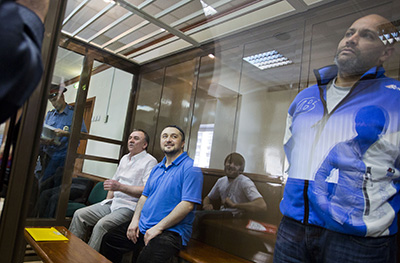More than seven years after the murder of Anna Politkovskaya, the prominent Novaya Gazeta journalist, a jury is hearing the case against five defendants in the killing. The suspects were first announced in 2011, but proceedings did not begin until July 2013, amid controversy. Three of the current defendants were earlier acquitted of Politkovskaya’s murder in a 2009 trial.
Among the five men currently being tried are three ethnic Chechen brothers, Dzhabrail, Ibragim, and Rustam Makhmudov, whom authorities accuse of executing the murder. Investigators allege that Rustam Makhmudov was the gunman, while Dzhabrail and Ibragim Makhmudov were his accomplices. Other suspects being tried in the case are Lom-Ali Gaitukayev, the Makhmudov brothers’ uncle, who is accused of receiving the order to kill the journalist from an unidentified mastermind and organizing the hit; and Sergei Khadzhikurbanov, a former police officer with the Moscow Directorate for Combating Organized Crime and a suspected accomplice in the murder. The latter two men are already serving jail terms on unrelated charges. Ibragim and Dzhabrail Makhmudov and Sergei Khadzhikurbanov were previously acquitted in Politkovskaya’s murder when a jury found the prosecution’s evidence against them flawed and insufficient.
All five defendants in this new trial have denied the current charges against them and pleaded not guilty, according to news reports.
A sixth suspect in the case–former police Lt. Col. Dmitry Pavlyuchenkov, who was originally charged with organizing the 2006 killing–was sentenced on December 14, 2012, in a deal that Politkovskaya’s family and colleagues said prevented the solving of the crime by precluding the identification of its true masterminds. Pavlyuchenkov’s trial was a two-day, secret proceeding, in which the former police official, under an arrangement he made with investigators, was tried as an accomplice in the crime rather than a key culprit. According to the deal, Pavlyuchenkov was obligated to fully confess his role in the murder and name its mastermind, Novaya Gazeta said. The journalist’s family and colleagues said Pavlyuchenkov did not fulfill those conditions, but their appeals to invalidate the deal have been denied. Also under Pavlyuchenkov’s deal with investigators, journalists were allowed in court only for the opening and closing statements; leaving all substantive deliberations and testimony in the former colonel’s trial sealed from the public.
A Moscow City Court judge sentenced Pavlyuchenkov to 11 years in a maximum-security prison and ordered him to pay moral damages of 3,000,000 rubles (US$96,786) to Politkovskaya’s adult children, Ilya and Vera, who said they found the sentence too lenient.
Against this backdrop of lowered expectations, the trial of the five suspects is now proceeding in Moscow City Court. The trial started in the summer of 2013 but was disrupted when the prosecution and defense could not agree on the jury selection. The second jury was then suddenly dismissed when it became clear that the Makhmudov brothers’ defense was winning over the jury to the detriment of the prosecution, according to local press reports.
The trial started in earnest in January, with the formation of now a third jury in the case. In the preceding months, the lead lawyer for the Makhmudov brothers, Murad Musayevhad, found himself the subject of a criminal investigation for allegedly bribing jury members in an unrelated case. Musayev has denied the accusations and said they were an attempt to take him off the Politkovskaya case and prevent him from clearing his clients.
The current trial has not attracted much media attention despite the fact that the hearings are open to the public. This could be due to the time that has elapsed since the journalist was shot and killed in the elevator of her Moscow apartment. And despite the fact that the case is now proceeding relatively smoothly, both Politkovskaya’s colleagues and her family insist that Pavlyuchenkov’s closed-door testimony is an important missing ingredient. That testimony is now unattainable because the Russian code of criminal procedure precludes it, but it could have led to the prosecution of the true masterminds of the murder.
But Novaya Gazeta Deputy Editor Sergei Sokolov, the journalist who has overseen the paper’s own investigation into Politkovskaya’s killing from the start, says there is one more chance to question Pavlyuchenkov. In the near future, Sokolov told CPJ, Pavlyuchenkov will be questioned in another case, the 2004 murder in Moscow of U.S. journalist and former Forbes-Russia editor Paul Klebnikov. If Pavlyuchenkov tries to reach a similar deal in the Klebnikov case as he did in the Politkovskaya case, “Novaya Gazeta will insist that the deal be made possible only if Pavlyuchenkov names the masterminds in both the Klebnikov and Polikovskaya murders,” Sokolov told CPJ.
